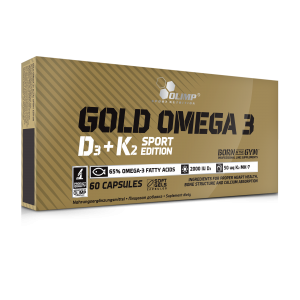Renewal of energy resources

Every athlete training both competitively and recreationally must pay attention to what they eat, as it has a direct bearing on their sports results. One of the most important aspects of nutrition in sport is the fulfilment of energy needs, most of which are covered at the expense of burning two energy compounds: carbohydrates and fats. The greater the intensity of muscle work, the more sugars are burned. The body has the capacity to accumulate them in the form of muscle glycogen. Since this process is most intensive in the first few hours after a workout, it is important that post exercise recovery occurs as quickly as possible and involves the right type of carbohydrates, ones with the proper rate of digestion and absorption by the body. If the stores of sugars are not fully replenished, the efficiency of subsequent workout may be lower. The total restoration of carbohydrate stores in the muscles can only take place after 24-48 hours. Replenishment of glycogen occurs at a rate of ca. 5% per hour – this process is faster immediately after exercise, and then slows down.
This is why carbohydrates ingested in the first hours after a workout should have a proper glycemic index. It is best to consume approx. 25-50g of sugar in a liquid form (OLIMP CARBO; OLIMP IZO PLUS) immediately after exercise.
OLIMP CARBO is a product addressed to those practicing endurance, strength as well as high-speed sports. If consumed immediately after intense physical training, it enables a very quick and efficient restoration of muscle glycogen, and promotes its overcompensation – a process determining an increase in muscle mass and strength and improvement in speed and endurance.
IZO-PLUS is a carbohydrate-mineral drink of isotonic properties, perfectly replenishing lost water, sugars and minerals after exercise or heavy physical labour. The preparation is particularly recommended to endurance sports enthusiasts (cycling, long-distance running). It prevents fatigue accompanying dehydration during prolonged exercise in a hot setting, as well as cardiovascular disorders and thermoregulatory mechanism disturbances.
After the initial replenishment of energy reserves in muscles, carbohydrates with higher content of dietary fibre should be included in meals, such as coarse cereal products, dark rice, groats and vegetables. Please note that the complete muscle glycogen recovery process may take about 1 2 days.
In general, high intake of carbohydrates improves the recovery of muscle glycogen stores, but their quantity in the diet should not be too high, as their excess can result in them being utilised during normal metabolic reactions instead of fatty acids, and thus an impairment of the fat burning process. In addition, a diet rich in carbohydrates can lead to a shortage of many nutrients in the body. Hence, it should always be remembered to keep a proper balance between the intake of carbohydrates, fat and protein and consider the appropriate energy content of the diet.
For the glycogen restoration process to proceed smoothly and without problems, the consumption of fats – particularly of animal origin – should be strictly limited in the first hours after a workout, since the presence of saturated fatty acids inhibits glucose transport across the cell membranes and reduces receptor sensitivity to insulin.
Preparation of a correct nutritional strategy should take into account not only the restoration of energy stores in muscles, but also the methods aimed at reducing their loss during exercise. This is particularly important in prolonged exercises. In view of the above, to slow down the breakdown of body’s own glycogen resources, intake of isotonic drinks (OLIMP IZO PLUS) before and during a workout proves beneficial.
Physical capacity depends on the amount of carbohydrates stored not only in muscles, but also in the liver. Glucose derived from hepatic glycogen is an essential source of energy for the brain. Its deficiency leads to the central nervous system fatigue, as well as reduced motivation and mental strength – endurance sportspersons in particular are most exposed to the latter. To prevent such incidents, branched-chain amino acids (OLIMP BCAA) are often used in supplementation, in the amount of ca. 1 g/10 kg bw at 45 minutes before the scheduled exercise.
After completed training, the restoration of carbohydrate reserves in the liver may be much more difficult and progress slower. During particularly long exercise, fatty acids start to penetrate into the hepatocytes in place of glycogen. To minimise this negative process, it is recommended that the meals eaten after a workout are dominated by products with high content of lipotrophic (dissolving fat) compounds, such as methionine, glutamic acid and choline (OLIMP LECITHIN). A rich source of these compounds in the diet are milk and low fat cottage cheese. At the same time, foodstuff rich in fat should be avoided.
When and how to properly take carbohydrate supplements?
Supplements can be taken before, during and after exercise. Depending on the time of consumption, it can play different roles:
- supplementation before exercise – enables to build small energy reserves. During the period preceding physical effort, isotonic solutions are usually used. Carbohydrate drinks at 6-8% (12-16 g carbohydrates/200 ml water) are taken in the amount of 200-400 ml, 15 minutes before starting the muscle work. OLIMP IZO PLUS is recommended here;
- supplementation during exercise – prevents the energy loss during muscle work, determines the proper use of fats in energy metabolism. During training or competition, it is recommended to use isotonic and hypotonic drinks. If the effort is a prolonged one, carbohydrate drinks should be taken in the amount of 200 ml every 20-30 minutes. OLIMP IZO PLUS is recommended here;
- supplementation after exercise – enables the restoration of lost energy resources and preparation of the body for the next training session. After the muscle work, concentrated carbohydrates (50 70 g/500 ml water) prove most beneficial – OLIMP CARBO, CARB BIOGENIX BX are recommended here.
During prolonged exercise, special drinks containing carbohydrates and MCT oil (OLIMP MCT) may be used. You can prepare the solution yourself according to the recommended formula: 1,000 ml of water, 100 g carbohydrates and 40 g of MCT (medium-chain triglycerides). Approximately 400 ml of so prepared drink should be consumed shortly before exercise, and during the workout, in the amount of 100-150 ml every 10-15 min.
In order to stimulate the anabolic processes, concentrated carbohydrate supplements containing pure glucose (dextrose) or maltodextrin (complex sugar) are usually used. Carbohydrates in the amount of 50-70 g are taken immediately after training, with simultaneous protein supplementation being recommended. OLIMP DEXTRO JUICE is suggested here.
KIF SDW 03/2007
MSc Pharm. Dariusz Szukała
Specialist in diet and supplementation
Laboratory of Sports and Metabolic Nutrition
www.apz.pl
BACK ›

